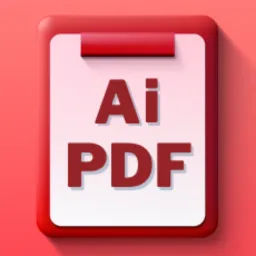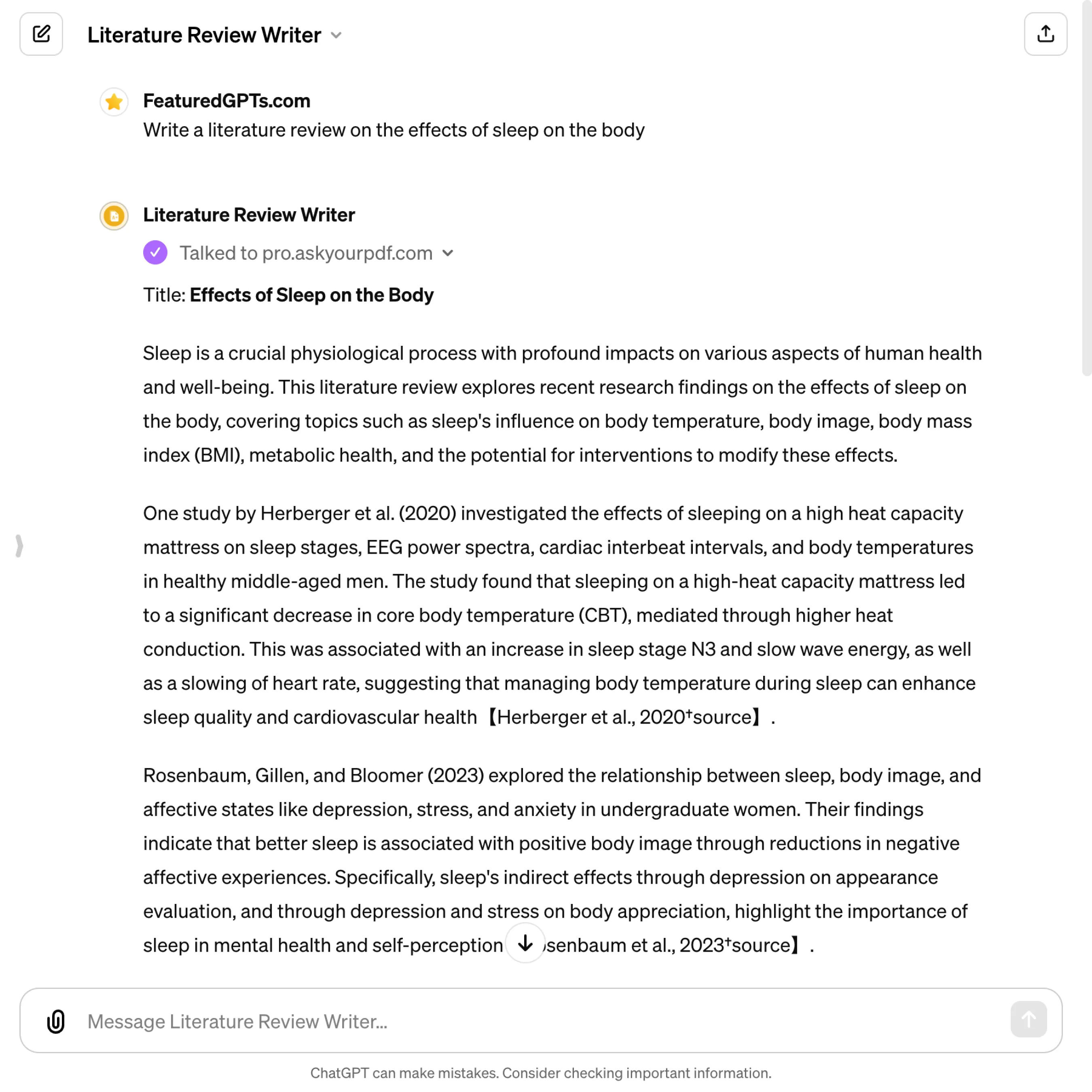
Literature Review Writer
I specialize in quickly generating high-quality literature reviews, summarizing papers, identifying key themes, and synthesizing conclusions.
What does Literature Review Writer do? (& its Use Cases)
Literature Review Writer streamlines your academic research, making literature review creation more efficient.
It simplifies the process of gathering, synthesizing, and citing academic sources.
For students
It aids in producing well-researched papers and understanding complex topics easily.
For researchers
Enhances the quality of literature reviews with comprehensive source analysis.
For academicians
Facilitates scholarly writing by organizing and presenting research findings effectively.
How to Use Literature Review Writer?
Create detailed, academically-oriented literature reviews by using the Literature Review Writer
Welcome to your go-to guide for mastering the Literature Review Writer, a specialized tool designed to streamline the process of creating detailed, academically-oriented literature reviews. Whether you're a student, researcher, or professional, this guide will walk you through the essential steps to effectively use this tool. Let's dive in.
Understanding the Tool
The Literature Review Writer is an AI-powered assistant crafted to help you synthesize academic sources into a coherent literature review. It's built to cater to various disciplines, offering insights and analyses of existing research. Remember, this tool is your ally in navigating the vast ocean of academic literature.
Getting Started
Define Your Topic: Begin with a clear and concise definition of your research topic. The more specific you are, the better the Literature Review Writer can tailor its search and synthesis to your needs.
Gather Your Keywords: Identify key terms related to your topic. These keywords will guide the tool in fetching the most relevant literature. Think of synonyms and related concepts to widen your search net.
Interacting with the Tool
Input Your Requirements: Communicate your needs to the Literature Review Writer. Include your topic, keywords, and any specific focus areas. If you have preferences for time frames, academic disciplines, or citation formats, make sure to mention these as well.
Refine Through Feedback: After receiving the initial output, take the time to review it. Provide feedback on any areas that need more depth, focus, or clarity. Your input is crucial for refining the literature review to meet your exact requirements.
Maximizing the Output
Review the Synthesis: The tool will present you with a synthesized literature review, including an introduction to the topic, summaries of relevant sources, and a comparative analysis or thematic categorization of the findings.
Check the Citations: Ensure that all sources are cited appropriately in your preferred citation format. The Literature Review Writer defaults to APA style but can adapt to other styles upon request.
Iterate as Necessary: Don't hesitate to request further refinements or adjustments. The goal is to produce a literature review that accurately reflects your research question and meets academic standards.
Conclusion
The Literature Review Writer is here to facilitate your research process, offering a streamlined way to synthesize and analyze academic literature. By following this guide, you're well on your way to creating comprehensive, well-crafted literature reviews that stand up to academic scrutiny. Remember, this tool is designed to be user-friendly, so dive in, experiment, and see how it can enhance your academic or professional endeavors.
Literature Review Writer's Testing Performance
Literature Review Writer's Core Features
Customized Literature Searches
Targets the challenge of navigating vast academic databases by using precise keywords to fetch relevant literature, streamlining research efforts.
Thematic Synthesis
Addresses the complexity of synthesizing research findings by organizing literature into themes, simplifying the analysis and understanding of broad topics.
Comparative Analysis
Solves the problem of identifying relationships and differences among studies by providing detailed comparisons, enhancing the depth of literature reviews.
Adaptable Citation Formatting
Eases the adherence to academic standards by offering flexibility in citation styles, ensuring that the review meets specific formatting requirements.
Iterative Refinement Process
Facilitates the customization of literature reviews through user feedback, allowing for continuous improvements until the output meets the user's needs.
Comprehensive Source Summarization
Tackles the issue of information overload by summarizing key points from each source, making it easier to grasp the essence of extensive research.
FAQs from Literature Review Writer
Literature Review Writer's Prompt Examples
Creating Literature Reviews
Generate a literature review on the impacts of climate change on marine biodiversity.
Summarize recent advancements in artificial intelligence and machine learning.
Provide an analysis of the economic effects of the COVID-19 pandemic.
Comparative Analysis of Studies
Compare the effectiveness of different COVID-19 vaccines based on recent studies.
Analyze the outcomes of various teaching methods in online education.
Evaluate the efficiency of renewable energy sources against fossil fuels in recent literature.
Thematic Categorization
Categorize the themes of mental health research during the last decade.
Organize the latest research on blockchain technology into thematic areas.
Classify the findings of studies on dietary impacts on chronic diseases by theme.
Adapting to Citation Styles
Format my literature review citations in APA style.
Convert my list of references to Chicago style for my history paper.
Adapt my research paper's bibliography to MLA format.
Iterative Review Refinement
Refine my literature review on social media's role in education with more recent studies.
Incorporate additional keywords into my search on urban sustainability practices.
Adjust the focus of my review on telemedicine to include more on patient satisfaction.








